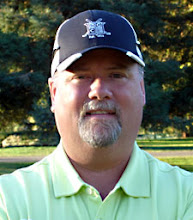Saturday, February 5, 2011
Pond Update
I hope you enjoyed Rob's post of our contraption which we've named many times including my favorite, 'The DuckWeedSuckInator'. This was a great team effort and we are still trying to improve on the original model. Our Equipment Manager, Jan Landreth has been especially helpful with her background in mechanical engineering and the ability to problem solve any obstacle in a unique way.
I'm lucky to have people like Jan and Rob who devote a portion of their free time researching our course problems instead of reading what their friends had for dinner on Facebook. These two are constantly coming in with new ideas and solutions that begin with, "Last night, I was looking at ......" We fuel off of each other's passion for our work and it feels good.
Our pond skimming device has been working pretty well, but we're pulling it back into the shop to make some minor adjustments. Rob, our staff cameraman, will snap some photos and get them up on the blog in case anyone is having a similar problem and would like to make a SuckInator of their own. Of course, we would like you to share any improvements you make to the simple design.
You may be wondering, how does a pond get that bad in the first place. Well, our main problem is a lack of depth. The two ponds on the course that are deeper than two feet are in very good condition with no algae or duckweed over the last two years. We've improved our algae control by reducing organic inputs into the ponds. Our main way of doing this was to grow up a buffer strip between the water's edge and maintained turf. Check out this post back in August, 2009 on lake buffer strips.
Duckweed reproduces at an alarming rate and can fill a pond very quickly. We have some pesticides that are similar to Round Up, but labeled for aquatics which we use to help control the floating weed. However, since our volume of water is so low, the decomposition of duckweed results in an oxygen loss and a potential fish kill. The pesticide is not responsible for killing fish, it's the loss of oxygen that does that. So, we are not comfortable spraying until we get the population of duckweed much lower than the blanket you currently see on a few of the holes. Winter time is the perfect opportunity while the weed is not growing or reproducing. Our skimmer can reduce the population to a manageable range and we can get these ponds looking like water again. More updates coming soon.
I'm lucky to have people like Jan and Rob who devote a portion of their free time researching our course problems instead of reading what their friends had for dinner on Facebook. These two are constantly coming in with new ideas and solutions that begin with, "Last night, I was looking at ......" We fuel off of each other's passion for our work and it feels good.
Our pond skimming device has been working pretty well, but we're pulling it back into the shop to make some minor adjustments. Rob, our staff cameraman, will snap some photos and get them up on the blog in case anyone is having a similar problem and would like to make a SuckInator of their own. Of course, we would like you to share any improvements you make to the simple design.
You may be wondering, how does a pond get that bad in the first place. Well, our main problem is a lack of depth. The two ponds on the course that are deeper than two feet are in very good condition with no algae or duckweed over the last two years. We've improved our algae control by reducing organic inputs into the ponds. Our main way of doing this was to grow up a buffer strip between the water's edge and maintained turf. Check out this post back in August, 2009 on lake buffer strips.
Duckweed reproduces at an alarming rate and can fill a pond very quickly. We have some pesticides that are similar to Round Up, but labeled for aquatics which we use to help control the floating weed. However, since our volume of water is so low, the decomposition of duckweed results in an oxygen loss and a potential fish kill. The pesticide is not responsible for killing fish, it's the loss of oxygen that does that. So, we are not comfortable spraying until we get the population of duckweed much lower than the blanket you currently see on a few of the holes. Winter time is the perfect opportunity while the weed is not growing or reproducing. Our skimmer can reduce the population to a manageable range and we can get these ponds looking like water again. More updates coming soon.
Subscribe to:
Post Comments (Atom)


0 comments:
Post a Comment